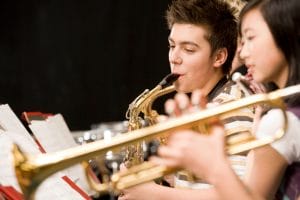 Q: My 15-year-old has asthma and is learning to play the saxophone. If he practices a lot, he has shortness of breath afterward and sometimes the next day. Should he choose a different instrument?
Q: My 15-year-old has asthma and is learning to play the saxophone. If he practices a lot, he has shortness of breath afterward and sometimes the next day. Should he choose a different instrument?
Dr. Bassett: Any exercise, even blowing into a windward or brass instrument can provoke asthma, notably shortness of breath, during and or after playing. It may also be a tip-off that is your son’s asthma is not optimally controlled.
In some studies, breathing exercises, a warm-up, drinking sufficient water, and a cool-down can better prepare a musician, especially if he or she has asthma. Although somewhat different than aerobic exercise, it may be helpful to use a short-acting rescue inhaler, such as albuterol, 20 to 30 minutes before playing an instrument.
This is an excellent opportunity to see his asthma specialist and have a spirometry test and exhaled nitric oxide (FENO) measurement to assess his asthma, and any need for additional therapy.
As to the choice of a saxophone, while there are conflicting study results as to whether playing wind instruments improves respiratory function with asthma, it’s notable that subjects tended to have a heightened awareness of symptoms and better asthma control.
Related:
How Does Traveling to a Colder Climate Affect Asthma?
Does an Adult Really Need to Use a Spacer with an Asthma Inhaler?
Dr. Clifford Bassett, allergist and asthma specialist, is the Medical Director of Allergy & Asthma Care of New York (Allergyreliefnyc.com; Twitter @allergyreliefny). He is on the faculty of NYU School of Medicine and Weill Cornell Medical College in New York City and is also the author of The New Allergy Solution: Supercharge Resistance, Slash Medication, Stop Suffering.
Submit a Question View all posts by this medical expert.

